|
|
|
Sort Order |
|
|
|
Items / Page
|
|
|
|
|
|
|
| Srl | Item |
| 1 |
ID:
133853
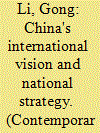

|
|
|
|
|
| Publication |
2014.
|
| Summary/Abstract |
The global order was set in place following the end of the Second World War by a consortium of western countries headed by the U. S. since then, major western countries have strived to maintain their long dominance in global politics and economics. With the rise of nationalist movements, former colonies gained their independence, and many developing countries joined the UN in recent years the economies of the emerging powers have grow rapidly and they have also joined WTO.
|
|
|
|
|
|
|
|
|
|
|
|
|
|
|
|
| 2 |
ID:
123596
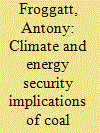

|
|
|
|
|
| Publication |
2013.
|
| Summary/Abstract |
The importance of the coal sector is often overlooked by the media when reviewing global energy. This is despite both its importance in many emerging economies and its impact on climate change. The current status and projections for coal use in Asia and Europe vary considerably. In Asia, growth in demand and availability of coal is resulting in its accelerated use. However, despite investment, production cannot keep up with demand, and coal trade in Asia is increasingly affecting international markets. In Europe, the environmental impacts of coal use, particularly CO2 but also particulates, are accelerating the closure of many power stations and delaying new build. Consequently, in most countries its contribution is set to decrease. However, some countries are planning new, large coal stations and are increasing operation prior to closure of some existing stations. The continued use of fossil fuels, especially coal, is resulting in emission levels that in the short term will exceed the internationally agreed climate protection objectives. Therefore, Europe and Asia need to accelerate their co-operation in developing carbon capture and storage and other new technologies and policies in order to minimise the emissions to the greatest extent possible.
|
|
|
|
|
|
|
|
|
|
|
|
|
|
|
|
| 3 |
ID:
133810
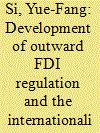

|
|
|
|
|
| Publication |
2014.
|
| Summary/Abstract |
The Investment Development Path (IDP) model has been widely accepted for illustrating the relationship between the inward and outward foreign direct investment (FDI) positions of a country and its economic status based on the data from developed economies. In recent years, however, outward FDI from developing economies has increased dramatically and it has been argued that institutions are 'forefront' factors in addition to the economic index. In this article, we use statistical data from China, which has gone through dramatic regulation reform and FDI development, to test the validity of the IDP model. We also trace the history of Chinese FDI regulation development to answer the following question: in what way are regulations important for FDI in different periods? We use Lenovo as a case study to show how a Chinese firm 'avoids' and 'adapts to' regulation changes. We find that the FDI development of China still follows the IDP model; however, the Chinese government has accelerated the whole process through active regulation reform. In a transition economy such as China, FDI co-evolves with the regulation, and the firms which can influence or foresee the policy changes can prosper considerably.
|
|
|
|
|
|
|
|
|
|
|
|
|
|
|
|
| 4 |
ID:
114105
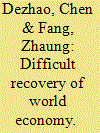

|
|
|
| 5 |
ID:
171437


|
|
|
|
|
| Summary/Abstract |
Prior research has demonstrated the importance of government policy in fostering innovation in sectors that face market failures, such as renewable energy. We examine the impact of policy on renewable energy innovations in emerging economies, which face market as well as institutional failures. We investigate how differences in the focus of policies may drive technology development efforts in different directions. Specifically, we propose that demand pull policies foster innovations in mature technologies by encouraging exploitation of readily available technologies, while supply push policies foster innovations in novel technologies by encouraging exploration and alleviating resource constraints in research and development. Using information on policy initiatives and renewable energy patents, we develop comparative case studies of four emerging economies over the years 2000–2015 in the renewable energy sector – Turkey, India, Brazil, and China. Our case findings illustrate that countries with a focus on pull policies innovate primarily in mature technologies, whereas ones with a focus on push policies have substantial innovations in novel technologies. We present a typology of policy and innovation focus, informed by our conceptual framework and case studies.
|
|
|
|
|
|
|
|
|
|
|
|
|
|
|
|
| 6 |
ID:
138396


|
|
|
|
|
| Summary/Abstract |
There are three main factors that have affected Indian energy sectors in the last few decades – the weather effect, rising affluence of the society and rising import prices of the oil supplies. The Indian economy has grown at a steady pace in the recent past but oil has somehow remained synonymous with energy resources.
|
|
|
|
|
|
|
|
|
|
|
|
|
|
|
|
| 7 |
ID:
132827


|
|
|
|
|
| Publication |
2014.
|
| Summary/Abstract |
This study challenges the implicit assumption of homogeneity in national institutional contexts made in past studies of (renewable) energy policy. We propose that institutional differences matter by focusing on several technology-specific and generic policy factors that can foster technology diffusion through private sector activity. More specifically, we explore perceptions of early adopters in emerging economy contexts using wind park project developers as an example. By applying a parsimonious method for our questionnaire as well as qualitative data we make several contributions: Methodologically, we introduce Maximum Difference Scaling to the energy policy domain. Empirically, we identify several public influences on private investment, and assess their relative importance. This leads to new insights challenging findings from industrialized economies; we identified additional institutional barriers to diffusion, hence, the requirement of a combination of technology-specific and generic policy measures.
|
|
|
|
|
|
|
|
|
|
|
|
|
|
|
|
| 8 |
ID:
133809
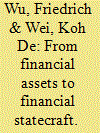

|
|
|
|
|
| Publication |
2014.
|
| Summary/Abstract |
Over the past few decades, China has accumulated over US$3.4 trillion of official foreign exchange reserves as it rises to become a global power. Do China's financial assets increase its ability to pursue its national interests internationally? With the globalisation and rising influence of Chinese state-owned enterprises, state-owned banks and sovereign wealth fund, as well as China's growing clout in several regional groupings, it is clear that China does possess the necessary mechanisms to assert its financial power. This article examines the efficacy and limitations of these mechanisms in Africa and Latin America, in the economic and political domains. In the economic domain, China has consistently used foreign oil contracts and acquisitions to secure direct oil flow from developing nations. An analysis of recent cases shows that while China is able to successfully harness its financial power in its pursuit of oil, it needs to fulfil its promises to the satisfaction of the recipient countries in order to maintain the value of its offers. In the political domain, China has used its financial assets to purchase diplomatic allegiance from various African and Latin American countries in support of its One-China policy. Studying both successful and unsuccessful cases reveals that while China is generally able to use its financial power in third-world countries against Taiwan successfully, its national goals have, in recent years, shifted to the economic realm, even with countries that still recognise the Taipei government.
|
|
|
|
|
|
|
|
|
|
|
|
|
|
|
|
| 9 |
ID:
110103
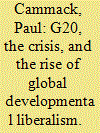

|
|
|
|
|
| Publication |
2012.
|
| Summary/Abstract |
The emergence of the G20 leaders' meeting during the recent global financial crisis as the 'premier forum for international economic cooperation' reflects a significant shift of hegemony over global governance towards the emerging economies but does not challenge the authority or objectives of the international financial institutions. On the contrary, successive G20 initiatives, culminating in the adoption of the Seoul Development Consensus for Shared Growth in November 2010, reveal both a further strengthening of the already close institutional relationship between the G20 and the Bretton Woods institutions and a strong shared commitment to a developmental form of global liberalism. This article charts the ascendancy of emerging economy perspectives through the lens of the G20, maps their ties to the imf and other international organisations, sets out the content of the new global developmental liberalism, and assesses the implications of emerging economy hegemony for the advanced and the emerging economies, respectively.
|
|
|
|
|
|
|
|
|
|
|
|
|
|
|
|
| 10 |
ID:
138922
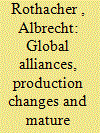

|
|
|
|
|
| Summary/Abstract |
The article reviews the changes in production, investment and trade patterns which have affected Japanese car exports to the EU and their foreign direct investments (FDI) in Europe. Global manufacturing alliances with shared productions and global component sourcing with lean production for most makers have changed the classical trading and FDI patterns beyond recognition. As a result, the trade policy instruments of old have lost most of their meaning and relevance. The abolition of EU import tariffs on Japanese cars in the context of the forthcoming foreign trade association (FTA) with Japan will hence in all likeliness have only a minimal impact on future trade and investment in the sector.
|
|
|
|
|
|
|
|
|
|
|
|
|
|
|
|
| 11 |
ID:
120479
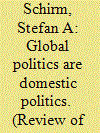

|
|
|
|
|
| Publication |
2013.
|
| Summary/Abstract |
Since 2008, the leaders of industrialised and emerging economies have engaged in steering the global economy through the G20. Divergent national positions were to be expected based upon the different stages of economic development and according to previously existing international groups. The actual controversies in the G20 did not reflect these patterns, however, but showed divergence both between industrialised countries and between emerging economies. In explaining this puzzle, I argue that the driving forces for global economic governance have ceased to be industrialised or emerging countries' alliances and levels of development. Rather, the causes for the positions of G20 members can be found in economic interests and ideas dominant in the domestic politics of countries. These societal influences shape governmental preference formation in both industrialised and emerging countries and consequently influence their behaviour in global governance. The resulting divergences weaken previously existing groups such as the G7 and the BRICs, and create a new pattern in world politics. This societal approach to explaining governmental positions in global economic governance is exemplified on the core G20 issues of stimulus/public debt and global imbalances/exchange rates.
|
|
|
|
|
|
|
|
|
|
|
|
|
|
|
|
| 12 |
ID:
094955
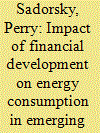

|
|
|
|
|
| Publication |
2010.
|
| Summary/Abstract |
Financial development is often cited as a very important driver of economic growth in emerging economies and it is thus likely that financial development affects energy demand. This study uses generalized method of moments estimation techniques to examine the impact of financial development on energy consumption in a sample of emerging countries. Several different measures of financial development are examined. Using a panel data set on 22 emerging countries covering the period 1990-2006, the empirical results show a positive and statistically significant relationship between financial development and energy consumption when financial development is measured using stock market variables like stock market capitalization to GDP, stock market value traded to GDP, and stock market turnover. The implications of these results for energy policy are discussed.
|
|
|
|
|
|
|
|
|
|
|
|
|
|
|
|
| 13 |
ID:
126625
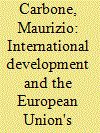

|
|
|
|
|
| Publication |
2013.
|
| Summary/Abstract |
This special section explores and explains how the European Union's (EU's) overall approach to international development has evolved since the beginning of the twenty-first century. At the international level, the rise of a group of emerging economies has not only provided developing countries with greater choices, but has also further enhanced their agency, thus questioning the EU's leadership and even relevance in international development. At the European level, the various (paradigmatic) shifts in each of the three key external policies-trade, security and foreign policy-and the EU's aspiration to project a coherent external action have collided with the EU's commitment to international development. Numerous tensions characterize the various nexuses in EU external relations, which ultimately challenge the EU's international legitimacy and (self-proclaimed) identity as a champion of the interests of the developing world. Nevertheless, the EU has made more progress than is generally acknowledged in making its external policies more coherent with its development policy. Moreover, the EU's relationship with developing countries has gradually become less asymmetrical, though not because of the EU's emphasis on partnership and ownership but more because of the increased agency of developing countries.
|
|
|
|
|
|
|
|
|
|
|
|
|
|
|
|
| 14 |
ID:
177691
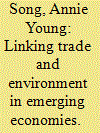

|
|
|
|
|
| Summary/Abstract |
In trade negotiations, developed countries have been frontrunners in advocating environmental protection whereas developing countries were reluctant to link environmental protection to their trade agreements. However, the recent trend of including environmental provisions (EPs) in free trade agreements (FTAs) shows a policy change in some of the emerging economies. Not only did they adopt EPs but they also actively introduced a comprehensive set of EPs – environmental chapters. Using the Republic of Korea (Korea)’s FTAs, this study explores why emerging economies come to include environmental chapters in their FTAs. Existing studies have offered explanations focusing on domestic politics. Yet, they do not specify the impact of the interaction between domestic and international politics. Through the lens of the two-level games, this study finds that the combination of domestic and international pressures plays an important role in making green FTAs. First, Korea has been pursuing environmental leadership at the world stage during the Korea-US FTA (KORUS) negotiation. Against this background, the US’ proposal to include an environmental chapter has reverberated within domestic politics. Second, the costs of implementing this environmental chapter were low. After the KORUS, Korea has been including similar environmental chapters because these chapters were cost-effective ways to promote its enduring environmental leadership. This finding has far-reaching implications for facilitating emerging economies’ green FTAs.
|
|
|
|
|
|
|
|
|
|
|
|
|
|
|
|
| 15 |
ID:
152748


|
|
|
|
|
| Summary/Abstract |
This article builds on recent literature to argue that emerging economies are simultaneously norm takers and norm makers involved in a two-way socialization process with developed countries. It does this by tracing China's engagement in negotiations surrounding the norm of common but differentiated responsibilities within the UN Framework Convention on Climate Change between the 2007 Bali conference that set out to negotiate a post–Kyoto Protocol climate agreement and the 2015 Paris conference that succeeded in doing so. In making this argument, I push against the predominant unidirectional and dyadic models of normative change by illuminating the more complicated role emerging economies are playing in this process. The article further distills a typology of normative change from the literature to help us understand how and why emerging economies engage in this process.
|
|
|
|
|
|
|
|
|
|
|
|
|
|
|
|
| 16 |
ID:
165426
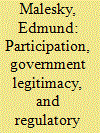

|
|
|
|
|
| Summary/Abstract |
This paper employs a field experiment in single-party–ruled Vietnam to test whether providing a broad-based representative sample of firms the opportunity to comment on draft regulations increases their subsequent compliance. We find three main outcomes of this treatment. First, treated firms exhibited greater improvement in their views of government’s regulatory authority. Second, these firms were more likely to allow government-affiliated auditors to examine their factories. Third, treated firms demonstrated greater compliance on the factory floor. Access and compliance were not explained by the receipt of advance information about the regulation’s requirements, and none of the three outcomes required that firms offer substantive comments.
|
|
|
|
|
|
|
|
|
|
|
|
|
|
|
|
| 17 |
ID:
138451
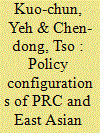

|
|
|
|
|
| Summary/Abstract |
This article predicts future policy configurations of PRC (People’s Republic of China) and East Asian emerging economies using Mundell’s trilemma and its quantitative measurement. Due to fear of capital flows and exchange-rate volatility, the East Asian emerging economies may still choose a collective exchange rate stability mechanism, which constitutes exchange rate stability, monetary independence, and limitation on capital flows with the support of precautious reserve accumulation and multilateral currency swaps. That is, a Bretton Woods-style mechanism will still be feasible after the global financial crisis. On the other hand, East Asia may be willing to decrease precautious reserve accumulation once a new international currency can be launched. However, the PRC’s attitude will be the critical factor.
|
|
|
|
|
|
|
|
|
|
|
|
|
|
|
|
| 18 |
ID:
121300
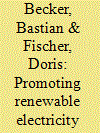

|
|
|
|
|
| Publication |
2013.
|
| Summary/Abstract |
China, India, and South Africa have recognized the importance of renewable electricity for their future development. In this paper, we investigate the experience of the three countries in applying generation-based policies to promote renewable electricity. We show that they have developed approaches that deviate from what the European experience suggests as successful. With a special focus on feed-in tariffs and auction-based tariffs, our comparison highlights the importance of policy choice and policy design specifications in meeting specific objectives. All three emerging economies face the necessity to promote electricity from renewable energies while keeping electricity prices low. Hence, they experiment with policies and design options, and arrive at country specific solutions. Despite applying different policy instruments and designs that put strong emphasis on low cost solutions, all three countries seem able to reach their ambitious deployment targets.
|
|
|
|
|
|
|
|
|
|
|
|
|
|
|
|
| 19 |
ID:
091574
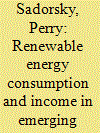

|
|
|
|
|
| Publication |
2009.
|
| Summary/Abstract |
Increased economic growth and demand for energy in emerging economies is creating an opportunity for these countries to increase their usage of renewable energy. This paper presents and estimates two empirical models of renewable energy consumption and income for a panel of emerging economies. Panel cointegration estimates show that increases in real per capita income have a positive and statistically significant impact on per capita renewable energy consumption. In the long term, a 1% increase in real income per capita increases the consumption of renewable energy per capita in emerging economies by approximately 3.5%. Long-term renewable energy per capita consumption price elasticity estimates are approximately equal to ?0.70.
|
|
|
|
|
|
|
|
|
|
|
|
|
|
|
|
| 20 |
ID:
133306


|
|
|
|
|
| Publication |
2014.
|
| Summary/Abstract |
It is well-known that energy conservation can lead to rebound effects that partly offset the original energy savings. One particular rebound mechanism is re-spending of money savings associated with energy savings on energy intensive goods or services. We calculate the average magnitude of this "re-spending rebound" for different fuels and countries, and for both energy and carbon (CO2) emissions. We find that emerging economies, neglected in past studies, typically have larger rebounds than OECD countries. Since such economies play an increasingly important role in the global economy the re-spending rebound is a growing concern. The re-spending effect is generally larger for gasoline than for natural gas and electricity. Paradoxically, stronger financial incentives to conserve energy tend to increase the rebound. This suggests that with climate regulation and peak oil the re-spending rebound may become more important. We discuss the policy implications of our findings.
|
|
|
|
|
|
|
|
|
|
|
|
|
|
|
|
|
|
|
|
|